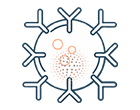Winkelstein, J., Marino, M., Johnston, R., Boyle, J., Curnutte, J., & Gallin, J. et al. (2000). Chronic Granulomatous Disease: Report on a National Registry of 368 Patients. Medicine, 79(3), 155-169. doi: 10.1097/00005792-200005000-00003
van den Berg, J., van Koppen, E., Åhlin, A., Belohradsky, B., Bernatowska, E., & Corbeel, L. et al. (2009). Chronic Granulomatous Disease: The European Experience. Plos ONE, 4(4), e5234. doi: 10.1371/journal.pone.0005234
Roos, D., & de Boer, M. (2014). Molecular diagnosis of chronic granulomatous disease. Clinical & Experimental Immunology, 175(2), 139-149. doi: 10.1111/cei.12202
Segal, B., Romani, L., & Puccetti, P. (2009). Chronic granulomatous disease. Cellular And Molecular Life Sciences, 66(4), 553-558. doi: 10.1007/s00018-009-8506-y
Arnold, D., & Heimall, J. (2017). A Review of Chronic Granulomatous Disease. Advances In Therapy, 34(12), 2543-2557. doi: 10.1007/s12325-017-0636-2
Agarwal, S. (2015). Chronic Granulomatous Disease. Journal Of Clinical And Diagnostic Research. doi: 10.7860/jcdr/2015/12139.5945
Roos D. (2016). Chronic granulomatous disease. British medical bulletin, 118(1), 50–63. https://doi.org/10.1093/bmb/ldw009
Rider, N. L., Jameson, M. B., & Creech, C. B. (2018). Chronic Granulomatous Disease: Epidemiology, Pathophysiology, and Genetic Basis of Disease. Journal of the Pediatric Infectious Diseases Society, 7(suppl_1), S2–S5. https://doi.org/10.1093/jpids/piy008






